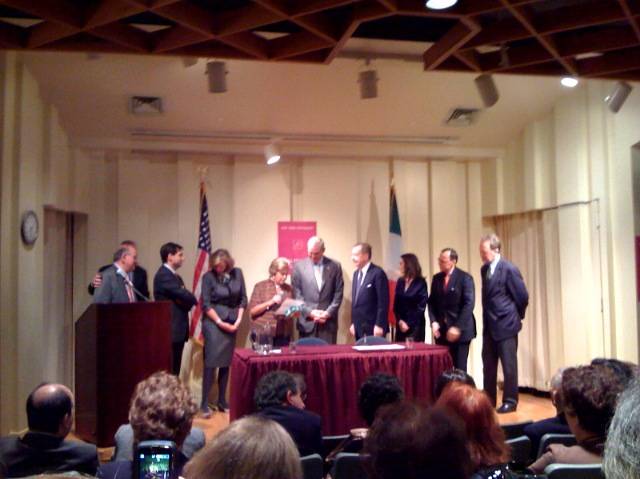Ambassador Ronald P. Spogli at Casa Italiana Zerilli-Marimò
The grandson of an Italian immigrant from Umbria, Ambassador Spogli built his way out of Los Angeles, California, with an exemplary career in the business world. After receiving his degree in History from Stanford University, Mr. Spogli obtained an MBA at Harvard, classmate of President George W. Bush. He later founded Freeman Spogli & Co., one of the leading private equity investors in the United States. Appointed Ambassador to Italy by President Bush, he returned to a country he already knew quite well, and not only because of his ancestry: he lived in Italy between the 1960s and 1970s working with Stanford University and worked in Milan on an important research project about internal migrations in Italy.
The host of the evening was Stefano Albertini, director of the Casa Italiana. The room was filled with many distinguished members of the Italian-American community of New York, including Baroness Mariuccia Zerilli-Marimò and Congressman Frank J. Guarini, all eager to listen to Ambassador Spogli's remarks on the relations between Italy and the United States.
Recognizing that "large waves of immigrants helped build our great nation" – including, of course, incredible numbers of immigrants from Italy –, Ambassador Spogli addressed the so-called "Atlantic divide", that according to many is causing Europe and the United States to drift apart. According to the Ambassador the divide is less important than many tend to think. He explained that the analysis of the relation between two great nations cannot become a trivial analysis of relations between political coalitions in power or, even worse, personal feelings between heads of state. "When you look to the complete picture you'll see that Italy and the U.S. are coming together", said the Ambassador. He admitted that there are differences in the handling of several fundamental issues, such as the degree of openness of the free market and the idea of what should be the role of a great power in the international arena, and slightly criticized the current Italian economic policy, warning that overtime the Italian economy will decline in comparison to other developed countries if no action is taken.
The Ambassador recognized the outstanding role Italy has been playing in the international arena, including its diplomatic and military activities in the Balkans, in Iran, in Afghanistan, in Lebanon and in Iraq. He defined Italy's military withdrawal from Iraq a "model withdrawal" conducted on a responsible basis and originated by a change of the government's policy. Ambassador Spogli also recognized the key role NATO is playing in the world, defining this organization "the most successful military alliance in history", that unlike the UN only has democratic countries as members.
After the remarks by the Ambassador an interesting debate started, during which Spogli declared that while Americans can learn a lot from Italy, its culture and it's history, Italians should try to learn from American meritocracy, competition and risk-taking mentality, in an advantageous relation of mutual growth. Ambassador Spogli also pointed out that the U.S. is and should continue to be a “magnet” to top-level researchers in all fields, even though nowadays there is no need to physically move from one country to another. Indeed, he described the prospect of working with others at a distance as “the beauty of the age we’re living in”.
Baroness Mariuccia Zerilli-Marimò presented to Ambassador Spogli the Zerilli-Marimò Medal. The Ambassador was only the fourth recipient of this prestigious award that is a token of appreciation for an outstanding role in the promotion of Italian culture in the world. Previous recipients of the award include Carlo Azeglio Ciampi, former President of the Italian Republic.


































i-Italy
Facebook
Google+
This work may not be reproduced, in whole or in part, without prior written permission.
Questo lavoro non può essere riprodotto, in tutto o in parte, senza permesso scritto.